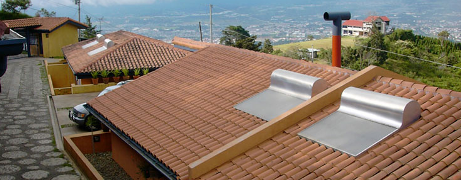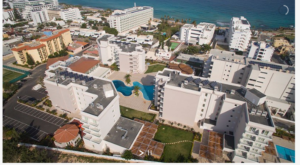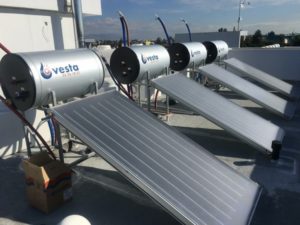Costa Rica: Rising Energy Prices to Benefit Solar Water Heating
November 25, 2015
Costa Ricans currently spend up to 40 % of their electricity bill on hot water supply. With an average annual increase of 5.3 %, the demand for electricity has quadrupled over the last 20 years and prices have more than doubled during the same period. Therefore, one should assume solar water heaters to be popular in a country where solar irradiation is as high as 2,100 W per m² and year. Unfortunately, the Costa Rican Statistical Office does not provide any figures on the total collector area installed across the country.
Photo: Swissol
Solar heating is still in the process of taking off, says Claus-Bernhardt Johst, renewables consultant at the Costa Rican Chamber of Industries (CICR) in San José. As he puts it, the rise of electricity cost is a constant issue in Costa Rica and high prices make solar heating competitive even without subsidies. In March 2015, CICR complained that electricity costs had increased more than in any other Central American country. And according to CICR, the industry suffers even more. Although manufacturers have to pay a higher charge per kWh than private consumers anyway, the moment that they pass a total consumption of 3,000 kWh per month, they will be charged a lower price per kWh, but will have to pay a fee for the capacity provided. Hence, bigger companies might pay more than they would in Panama, El Salvador or Guatemala – and electricity prices may become a sales argument for commercial costumers of solar thermal systems too.
|
|
Price in CRC = Costa Rican Colón |
Price for installed capacity |
| Basic tariff, residential, total consumption of less than 200 kWh/month |
81.08 |
0.00 |
| Price for any additional kWh, residential |
145.48 |
0.00 |
| General tariff for less than 3,000 kWh / month |
121.07 |
0.00 |
| Total consumption of 3,000 kWh / month and above |
72.25 |
11,975.43 |
Electricity prices as of September 2015; 100 CRC = 0.19 USD
Source: Grupo ICE, Tarifas actuales
National target: 10 % of households to use solar-heated water by 2030
The National Energy Plan 2015 to 2030 stipulates that 10 % of all residential energy consumers ought to have domestic water heating systems with solar energy until 2030 (see attached document in Spanish). This is linked to norms about the use of solar energy in newbuilds, which should be defined by 2020. In fact, Costa Rica has already established rules for the quality assessment of solar thermal equipment based on international norms. But according to Natalia Alvarado, President of the Costa Rican Association of Solar Energy, Acesolar, those rules are not binding ones. Still, they are an indicator of the increasing maturity of solar thermal business across the country.
No estimate of annual market volume
Solar water heating, Alvarado says, has recently become more popular in the residential sector, in tourist resorts and even in some companies which use collectors for process heat applications. While vacuum tube collectors are imported, some flat plate collectors are produced in the country. Again, because of missing market data, it is impossible to state the exact market share of locally manufactured equipment. The exact size of the market is hard to determine, Alvarado says. In 2013, Swissol representatives said that the total annual market volume was around 5,000 to 6,000 m² of glazed collectors, of which around 30 % were vacuum tubes, mostly imported from China. But neither Swissol nor Acesolar confirmed the data or were willing to give new estimates. Reto Rechsteiner, Owner of Swissol, says that his company keeps producing thermosiphon systems, but he adds that today, unglazed pool collectors account for the biggest share in the company’s sales.
Don Skipton, General Manager of distributor CR Solar, an installer of solar thermal systems and PV panels, calculates that the gross potential for solar water heating in Costa Rica may add up to more than 2 million m². “Electricity prices are so high, i.e., USD 0.30 per kWh versus USD 0.12 kWh in the USA, that solar panels and solar heaters make a lot of economic sense in Costa Rica,” Skipton replied to an information request by solarthermalworld.org. But he questioned the speed at which potential clients would jump on board. “If people were educated as to the benefits and had the funding or credit, then the market would be available immediately.”
Far-reaching tax exemptions for renewable and energy efficiency technology
Costa Rica grants tax exemptions for equipment designed to reduce power consumption. They consist of exemptions from import tax, VAT and sales taxes and are described in the document on tax exemptions attached to this news article (available in Spanish only). These rules are part of a bundle of measures intended to improve energy efficiency as stipulated in the National Energy Plan 2015 to 2030. According to the plan, the Costa Rican government wants to increase public awareness of the need for increased energy efficiency by training 332 teachers from primary and secondary schools and 5,400 students per year. Additionally, each year 80 science teachers are to receive additional training on the principles of electric energy and energy efficiency.
The National Energy Plan also stipulates that by the end of 2016, Costa Rica is to conduct a study identifying possible energy efficiency or renewable projects in existing building stock. Until 2017, the Costa Rican government is to establish a mechanism which will promote green buildings. Soon, more public institutions might be buying solar water heating equipment, as twenty institutions will have to comply with energy efficiency rules between 2015 and 2018.
Acesolar was founded in 2012 and counts more than 50 companies and an additional 66 individuals among its members. President Natalia Alvarado works at CNFL (Compañia Nacional de Fuerza y Luz).
This news was written by Vanessa Kriele, a German freelance journalist specialised in renewable energies and world economics.
More information
Energy Department: http://www.dse.go.cr
Acesolar: http://www.acesolar.org
Costa Rican Chamber of Industries: http://www.cicr.com/
Swissol: http://www.swissol.net
CR Solar: http://www.crsolar.com


